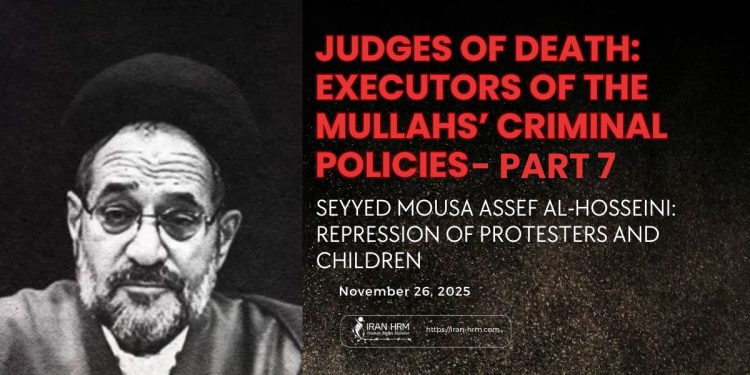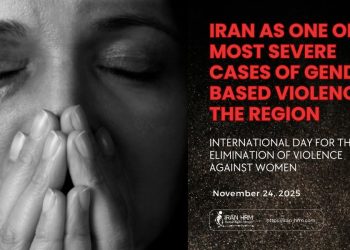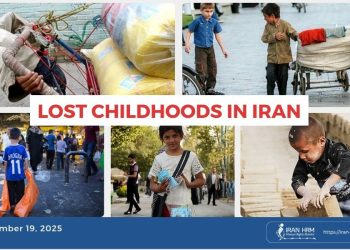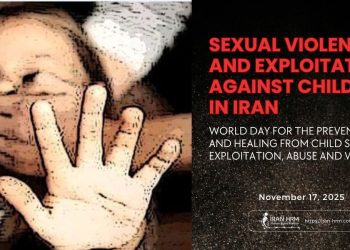Seyyed Mousa Assef al-Hosseini, the head of Branch 1 of the Revolutionary Court of Karaj, is one of the most well-known figures within the judiciary of the ruling regime in Iran. His name repeatedly appears in cases involving heavy charges, death sentences, the denial of legal defense, fast-tracked and non-public proceedings, and harsh treatment of political defendants. His direct role in issuing death sentences against Mohammad-Mehdi Karami and Seyyed Mohammad Hosseini in December 2022, as well as his handling of the case of 15 detained children and teenagers in Karaj, has made him one of the central symbols of systematic violations of fair-trial standards.
During the Karaj protests in November 2022, fifteen children and teenagers were arrested on charges of killing Rouhollah Ajamiān, a member of the Basij force. According to the judiciary’s spokesperson, five defendants were sentenced to death and eleven others—including three minors under 18—received long prison terms. The case was adjudicated at the Alborz Revolutionary Court under the authority of Assef al-Hosseini.
Independent lawyers have stated that the defendants were denied access to chosen lawyers and were also deprived of mandatory personality assessments. Saeed Dehghan, a human-rights lawyer, wrote on his personal account:
“One of the most anti-lawyer judges is Assef al-Hosseini. In one of the most unlawful courts, without lawyers and without personality reports, he is handling the cases of ten children facing heavy charges.”
Several well-known political prisoners whose cases were previously handled by this judge have warned about his unlawful and violent conduct. Arzhang Davoudi, a long-term political prisoner, described him in a letter from prison as “an unstable, uneducated cleric” and “a born criminal,” urging international organizations to examine his psychological fitness.
Political prisoners Ali Moazami Goudarzi and Parvin Mohammadi have also, in separate reports, accused al-Hosseini of unlawful conduct, coercion for forced confessions, and issuing pre-determined verdicts. They stated that he lacks the psychological and judicial competence required for a judicial position.
This report, based on verifiable information and direct testimonies from defendants and lawyers, examines his career path, methods, and the structural violations seen in cases judged by Assef al-Hosseini.
1. Background and Judicial Position
1.1 Identity and Background
Seyyed Mousa Assef al-Hosseini, son of Seyyed Reza, was born in the village of Kukaj-Now in Qazvin province. His national ID number is 5389847008.
He began working at the Karaj Revolutionary Court in the early 2000s and for years has handled security-related cases, protest-related cases, and drug-related cases.
1.2 Role in the Judicial Structure
In recent years, Assef al-Hosseini has been one of the most influential figures in the Karaj Revolutionary Court. He has also adjudicated security cases in Isfahan.
The nature of the cases assigned to him—mostly protesters, civil activists, political prisoners, and minors—shows that he is embedded within the security-judicial apparatus of the mullahs’ regime responsible for suppressing social movements and public protests.
2. Direct Role in the Death Sentences of Mohammad-Mehdi Karami and Seyyed Mohammad Hosseini
2.1 Arrest and Case Formation
Following the nationwide protests of 2022, a case titled “the killing of a Basij member” was opened in Karaj. Arrests were carried out in a highly security-driven context, with no access to legal counsel, accompanied by violence and psychological pressure. Many detainees were immediately transferred to security detention centers.
2.2 Proceedings
The case moved to sentencing in only a few weeks—without meeting minimum fair-trial standards.
According to the lawyers, none of the defendants were allowed to choose independent counsel; only state-appointed lawyers were imposed.
Court sessions were held in a few short hearings:
- Not open to the public
- Families were denied attendance
- No forensic examination or independent review
- No reconstruction of the scene
2.3 Forced Confessions and Violation of Defense Rights
Both main defendants, Mohammad-Mehdi Karami and Seyyed Mohammad Hosseini, told the court that their confessions were extracted under torture, beatings, and threats. They repeatedly told the judge that their statements were “the product of torture.”
Assef al-Hosseini dismissed these claims and issued verdicts based solely on the recorded confessions and security-agency reports.
2.4 Issuance and Execution of Death Sentences
The death sentences were issued in December 2022 and carried out soon afterward.
Despite extensive legal objections and repeated appeals from families, the executions were not halted. Internationally, these cases are widely cited as clear examples of unfair trials and violations of the right to life.
3.The Case of 15 Detained Children and Teenagers: A Clear Violation of Child Rights
3.1 Arrests
After the November 2022 protests in Karaj, fifteen children and teenagers—some under 18—were arrested.
Arrests were often accompanied by beatings, and some minors were taken to detention with visible injuries.
3.2 Judicial Process
Assef al-Hosseini took full control of the case, ignoring all legal protections afforded to children. He examined the case at the Revolutionary Court instead of the Juvenile Court.
Key violations:
- No access to chosen lawyers
- Extremely rapid proceedings (a few short sessions)
- No personality assessments
- Reliance on confessions extracted under pressure
- Disregard for minors’ age and vulnerability
3.3 Sentences Issued
Despite the families’ objections, Assef al-Hosseini issued:
Five death sentences:
- Mohammad-Mehdi Karami (22, laborer; executed 7 January 2023 at Raja’i-Shahr Prison)
- Seyyed Mohammad Hosseini, son of Seyyed Hassan (39; executed 7 January 2023)
- Hamid Ghareh-Hassanlou (hospitalized due to severe injuries; unclear status)
- Reza Arya, son of Yahya
- Hossein Mohammadi (also known as Amin-Mehdi Shokrollah-i)
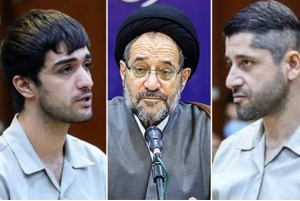
Long prison sentences and exile for others:
Shayan Charani, Mohammad-Amin Akhlaqi, Amir-Mehdi Jafari, Reza Shaker Zowardehi, Farzaneh Ghareh-Hassanlou, Javad Zargaran, Behrād Ali-Kenari, Ali Moazami Goudarzi, Arian Farzam-nia, Mohammad Mohammadi, and one unnamed individual.
This set of rulings is among the most extreme examples of judicial action against children and teenagers in the history of the Iranian judiciary.
4. Death Sentences in Drug-Related Cases
4.1 Record in the 2000s
In 2006–2007, Assef al-Hosseini issued numerous death sentences, including:
- Death sentence for 17 people in a single drug-related case
- Death sentence for an individual over 51 grams of heroin
These rulings illustrate his pattern of extreme, disproportionate sentencing without independent expert review. In these cases, the fundamental principle of proportionality of punishment—recognized across judicial systems—was ignored.
4.2 Reliance on Forced Confessions and Security Reports
Many drug-related cases were based solely on initial arrest reports and confessions made during interrogation—statements some later retracted, saying they were made under pressure.
5. Systematic Pattern of Human Rights Violations
5.1 Secret and Non-Public Proceedings
Almost all security-related trials under his authority are held behind closed doors.
This secrecy is a primary tool for denying defendants the right to defense, public scrutiny, and fair treatment.
5.2 Denial of Lawyers
In most cases, chosen lawyers were not allowed to participate. Independent lawyers report systematic obstruction, including denial of access to case files.
5.3 Disregard for Evidence of Torture
Multiple defendants appeared in court with visible injuries—bruises, fractures, signs of beatings—but Assef al-Hosseini refused medical examinations and ignored torture claims.
5.4 Pre-Determined Verdicts
The pace and structure of the trials indicate that verdicts were pre-set, with court hearings serving merely as formalities.
Trials completed in a few brief sessions without substantive review do not meet any fair-trial standard.
5.5 Violations of Child Rights
Trying minors under 18 at a Revolutionary Court—and issuing death sentences for some—constitutes a direct violation of the Convention on the Rights of the Child, to which the regime is a signatory.
6. Legal Analysis
6.1 Violations of the Universal Declaration of Human Rights
His actions violate:
- Article 5: Prohibition of torture
- Article 9: Protection against arbitrary arrest and trial
- Article 10: Right to a fair and public hearing
- Article 11: Presumption of innocence; prohibition of forced confessions
6.2 Violations of the International Covenant on Civil and Political Rights (ICCPR)
Systematic violations include:
- Right to counsel
- Right to a competent and impartial tribunal
- Right to appeal
- Prohibition of forced confessions
6.3 Violations of the Convention on the Rights of the Child (CRC)
- Requirement for juvenile-specific courts
- Prohibition of torture
- Absolute ban on the death penalty for individuals under 18
None were respected.
7.Conclusion
Judge Seyyed Mousa Assef al-Hosseini is one of the prominent symbols of unfair trials, abuse of judicial authority, and death sentences based on coerced confessions within the judicial structure of the ruling regime in Iran.
His record—particularly his direct role in executing two young protesters and trying children—reveals a clear and alarming pattern of judicial violence that requires immediate suspension, independent investigation, and international accountability.

